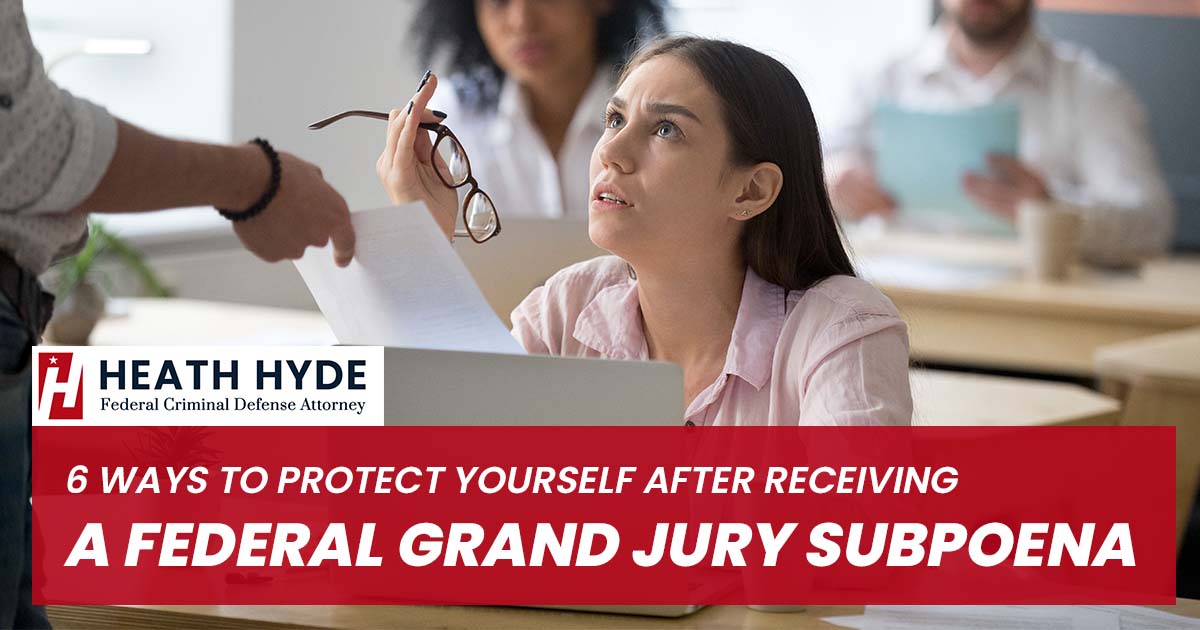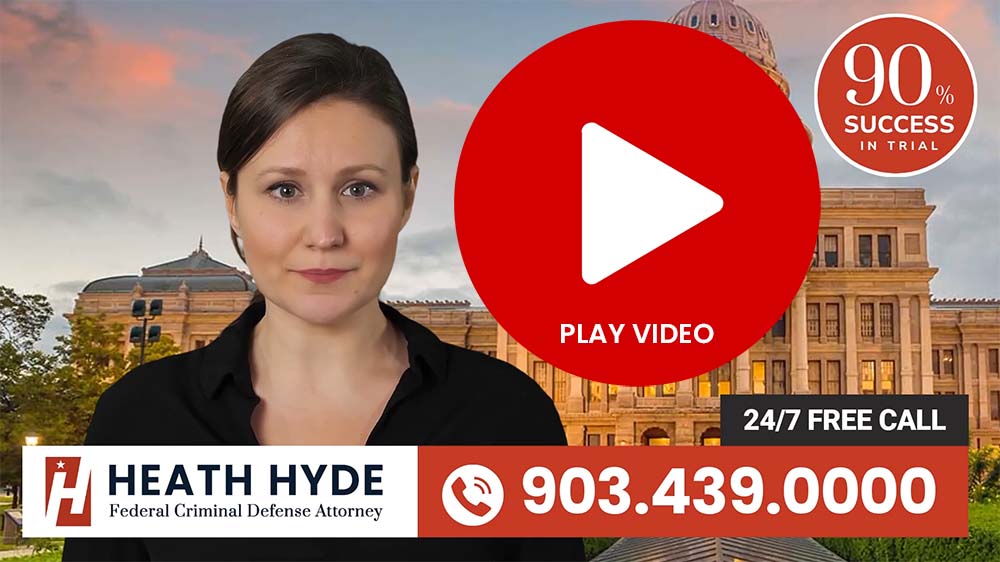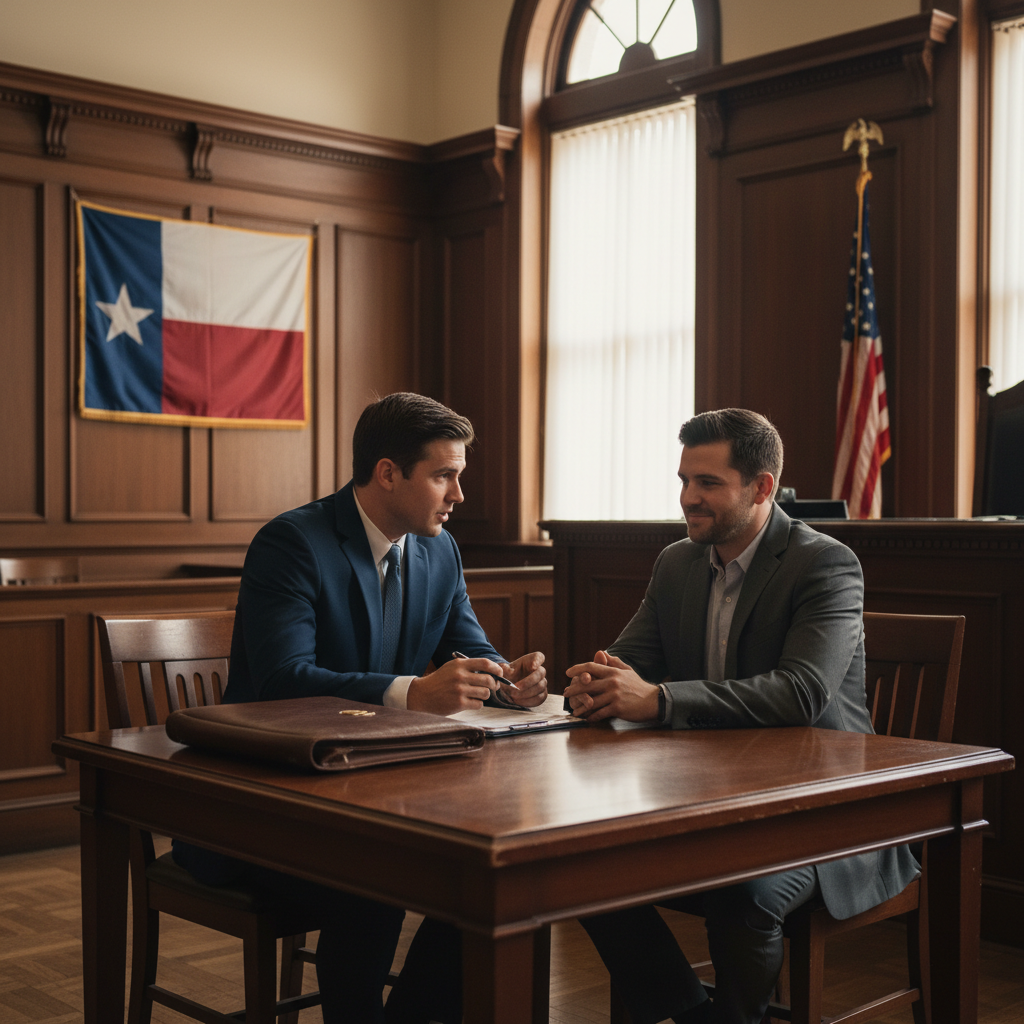Upon being served with a federal grand jury subpoena, the process of protecting yourself begins immediately. Whether you are being targeted in the government’s investigation or you are currently being treated as a witness (or, as is often the case, you have no idea), the risks of inaction are substantial, and you need to make informed decisions in order to mitigate your risk of federal prosecution.
While the potential consequences of being served with a federal grand jury subpoena are immense, there are many strategies available to protect yourself as well. This includes strategies to be deployed while preparing your response and extends beyond the culmination of the grand jury proceedings. From challenging the subpoena itself to challenging the grounds for indictment by a grand jury, federal grand jury recipients need to be prepared to defend themselves at all stages of the process.
1. Making Contact with the U.S. Attorney’s Office
At this point, the U.S. Attorney’s Office knows far more about your case than you do. Even if you have reason to believe that you are at risk for being targeted in a federal investigation, you do not know whether the subpoena relates to what you think it might relate to or whether it relates to another matter entirely.
As a result, upon receiving a federal grand jury subpoena, it is important to make contact with the U.S. Attorney’s Office promptly in order to glean as much information about the investigation as possible. As Assistant U.S. Attorneys generally will not speak with the targets of federal investigations directly, and as communicating effectively with the U.S. Attorney’s Office requires a thorough understanding of federal criminal law and procedure, this is a task that should be handled by your federal defense lawyer.
When communicating with the U.S. Attorney’s office, your defense lawyer will generally seek to obtain the answers to questions such as:
- Are you a target or subject of the government’s investigation, or are you currently being treated as a witness?
- What is the nature of the investigation, and what are the specific allegations underlying the issuance of the federal grand jury subpoena?
- Is the Assistant U.S. Attorney willing to consider modifying the scope of the subpoena in order to avoid overly-burdensome document production obligations or to omit requests for irrelevant information or testimony?
- If you are a target, have any other alleged co-conspirators been subpoenaed to testify or produce documents in connection with the government’s investigation?
In many cases, opening a dialogue with the U.S. Attorney’s Office can substantially limit the burdens of responding to a federal grand jury subpoena while also providing key insights for developing an overall defense strategy.
2. Filing a Motion to Quash
If direct communications with the U.S. Attorney’s Office do not result in satisfactory reduction of the scope of the subpoena, then it may be necessary to file a motion to quash in federal district court. Although it is unlikely that the judge will quash the subpoena entirely, since the U.S. Attorney’s Office has the authority to issue grand jury subpoenas without prior judicial approval, federal judges will often be receptive to tailored and well-reasoned motions focused on limiting subpoena recipients’ testimony or document production obligations. Depending upon the scope and language of the subpoena as well as the particular circumstances involved, potential grounds for filing a motion to quash a federal grand jury subpoena include:
- Procedural deficiencies
- Requests for irrelevant information
- Requests for information already in the government’s possession
- Requests for information not in the subpoena recipient’s custody or control
- Overly-broad or unduly-burdensome requests
- Unreasonably intrusive and oppressive requests
- Vague and indefinite requests
3. Thoroughly Preparing Your Testimony or Document Production (or Both)
Assuming that you will likely have at least some obligation to testify or produce documents (which is one of the few assumptions you can make during a federal investigation), concurrently with undertaking efforts to challenge the subpoena, it is also necessary to begin preparing your response.
Due to the amount of time and effort involved, you cannot afford to await the outcome of any negotiations or formal court challenges before beginning this process.
The steps involved in responding will depend on whether you received a federal grand jury subpoena ad testifacandum (requiring testimony) or a federal grand jury subpoena duces tecum (requiring document production); however, the volume of work involved in responding to both types of subpoenas is substantial.
For both targets and witnesses, failing to adequately respond to a federal grand jury subpoena can potentially lead to charges for contempt. As a result, regardless of your role in the government’s case, you need to ensure that you submit a legally-compliant response.
4. Asserting the Attorney-Client Privilege
A key consideration involved in responding to a federal grand jury subpoena is preserving the attorney-client privilege. Regardless of whether you are being treated as a target or a witness, any communications between you and your legal counsel are privileged against disclosure in federal grand jury proceedings.
As a result, not only does the privilege allow subpoena recipients to withhold potentially-incriminating information; but, by engaging defense counsel to assist in the subpoena response process, activities and communications undertaken in response to the subpoena can be protected as well.
Critically, the attorney-client privilege protects more than just direct communications (i.e. emails and text messages) themselves. It also protects documents prepared by or in conjunction with legal counsel as well as other records generated as a result of or in relation to the attorney-client relationship.
Due to the potential breadth of the privilege and the importance of preserving it, privilege-related considerations should factor greatly into both the preparation of grand jury testimony and the production of documents in response to a federal grand jury subpoena duces tecum.
5. Asserting the Fifth Amendment Privilege Against Self-Incrimination
When responding to a federal grand jury subpoena, individuals have the right to assert the Fifth Amendment privilege against self-incrimination. However, the privilege does not apply to business entities targeted in federal grand jury investigations, nor does it apply to individuals who are subpoenaed in their capacity as the records custodial of a business entity.
With regard to producing documents, federal courts have held that the contents of requested documents are not subject to the Fifth Amendment privilege. However, if the act of producing documents is itself incriminating, then it may be possible to assert the privilege in response to a subpoena duces tecum.
6. Filing a Motion to Dismiss the Grand Jury’s Indictment
Suppose you do everything in your power and the grand jury still returns an indictment. Does this mean that a federal trial (or plea deal) is now inevitable? Not necessarily.
There are a number of potential grounds for challenging an indictment. Depending upon the events that transpired during the grand jury proceedings, you may be able to file a motion to dismiss the indictment based upon:
- Bias and Prejudice of the Grand Jury– In addition to providing federal grand jury subpoena recipients with the privilege against self-incrimination, the Fifth Amendment also requires that juries be unbiased, independent, and adequately informed. If there is evidence to suggest that the grand jurors did not arrive at their decision to indict independently and impartiality, then grounds may exist to pursue a motion to dismiss.
- Excessive Reliance on Hearsay– While hearsay testimony is admissible in federal grand jury proceedings, such testimony must be “presented on its merits so that the grand jurors are not misled into believing that the witness is giving his or her personal account.” If hearsay testimony is falsely presented as reliable, or if the U.S. Attorney’s Office relies excessively on hearsay evidence when arguing for an indictment, then any indictment issues may violate the defendant’s Fifth Amendment rights.
- Failure to Disclose False Statements– In addition to disclosing the nature of hearsay testimony, federal prosecutors must also inform the jury of any statements made during the grand jury proceedings that are known to be false and that are potentially material to the grand jurors’ decision to indict. Regardless of materiality, perjured statements must be disclosed to the court and defense counsel as well.
- Failure to Present Exculpatory Evidence– In certain federal jurisdictions, the prosecution’s failure to present the grand jury with exculpatory evidence can provide grounds to file a motion to dismiss. In order to warrant dismissal, the evidence must generally be so substantial as to clearly negate guilt – simply arguing that the U.S. Attorney’s Office omitted some relevant evidence will not be enough.
- Prejudicial Publicity– In grand jury proceedings that receive press coverage, the grand jurors must make their decision based upon the evidence presented in court, and not upon any information or conjecture reported by the media. If it can be shown that grand jurors had access to negative press concerning the defendant’s alleged criminal activity, then this may also be sufficient to justify dismissal of the indictment.
Speak with a Grand Jury Subpoena Attorney at Heath Hyde Today
Our experienced federal defense lawyers and former federal prosecutors are available to discuss your grand jury subpoena. To find out if you have grounds to challenge the subpoena and to be preparing your response with the protection of the attorney-client privilege, Call 903.439.0000 or request a free initial consultation online now. Federal grand juries can issue subpoenas for 10 different sorts of material.
Grand Jury Subpoenas and Investigation Defense Tips
Heath Hyde is a leading federal defense litigation attorney in the United States. Heath gives you the sensation of being entirely safe right away. He is kind, considerate, and fascinating. His legal strategy worked flawlessly.






